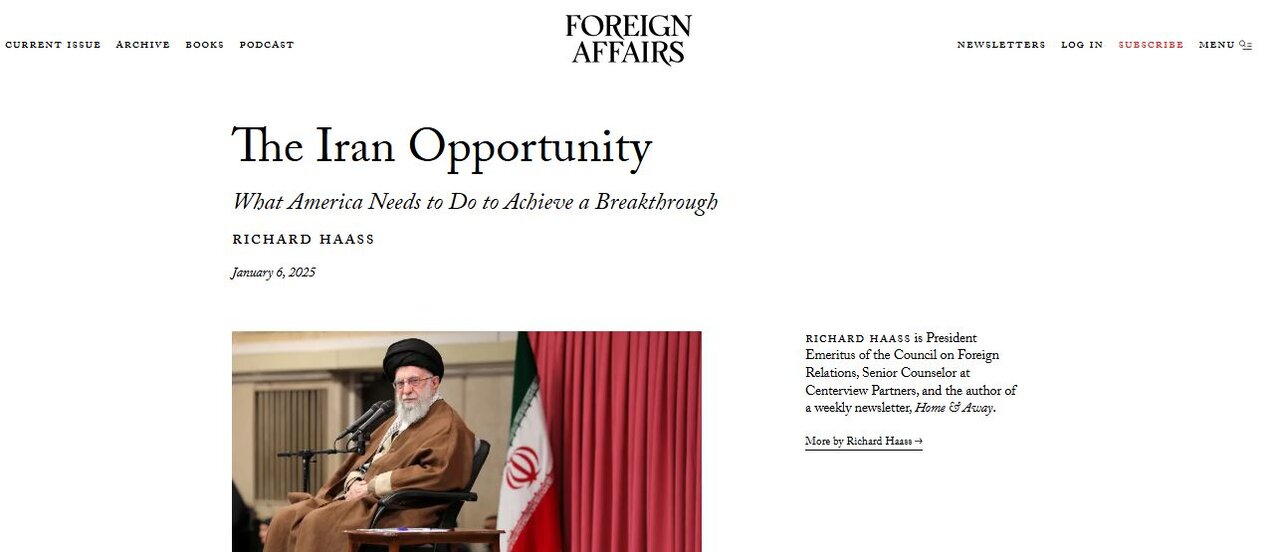Regional setbacks will not fulfill the Western dream of ‘regime change’ in Iran

TEHRAN – Since October 2023, when Hamas launched its surprise offensive on Israel, the landscape of West Asia has been shifting. The operation brought the Palestinian cause back to the forefront of media attention and sparked debate in elite circles. However, despite numerous Western claims, Iran's regional influence remains a significant factor in the power dynamics of West Asia.
In a recent Foreign Affairs article titled "The Iran Opportunity: What America Needs to Do to Achieve a Breakthrough," Richard Haass advocates for a combination of force and diplomacy against Iran. Haass writes, "It is hard to think of a country that has lost as much influence in as short a time as has Iran." However, there are several factual inaccuracies in his assessment of the situation on the ground.
For over a year and a half, Tel Aviv has targeted Hezbollah facilities and fighters across Lebanon, yet these efforts have been largely unsuccessful. Hezbollah could launch operations in northern occupied Palestine, and even deeper into Haifa and Tel Aviv, very quickly if Israel were to violate the ceasefire on a large scale. Furthermore, without Hezbollah's participation in the political process in Beirut, the deadlock in Lebanon would likely have continued, as evidenced by the election of Joseph Aoun as president.
The fall of the Assad government in Syria was certainly a setback for the Resistance Axis. However, the Axis was not solely dependent on Syria; Hezbollah was a significant force long before Damascus became a logistical hub for the Lebanese resistance.
Ansarullah in Yemen also provides a good example of a Resistance faction operating independently. Despite being under siege by the Saudi Arabian-led coalition, Ansarullah has successfully thwarted attempts to overthrow the government in Sana'a. Yemenis have been launching attacks in the Red Sea and surrounding waters against U.S.-Israeli interests. They have also successfully launched missiles and drones into occupied Palestine, despite being constantly under attack by the U.S.-led coalition.
After more than 15 months of Israeli attacks on Gaza, Tel Aviv has finally accepted the terms of a ceasefire, which could be viewed as a victory for Hamas. This three-phase ceasefire deal will take months to complete, but each of the agreed-upon terms appears to be a major concession for the Resistance group. Tel Aviv’s stated goal of "completely" eliminating Hamas has not been achieved. The agreement requires Israel to fully withdraw from Gaza and to exchange captives for a large number of Palestinian prisoners. Furthermore, Israel will gradually allow unarmed Palestinians to return to the northern part of the Gaza Strip, and a significant increase of aid, up to 600 trucks per day, will be allowed into the territory.
As the article rightly points out, Iran will likely try to rebuild its powerful network of resistance against Western imperialism. While the Resistance Axis may have suffered some operational setbacks, these are not irreversible.
Hass, in his article, echoes Western claims that Iran is pursuing nuclear weapons. However, based on Tehran's continued cooperation with the IAEA and adherence to the Non-Proliferation Treaty (NPT), it is evident that Tehran is not seeking a nuclear bomb. Iran's reactions have been a result of escalations against the country. The U.S. withdrawal from the Joint Comprehensive Plan of Action (JCPOA) was the initial trigger for Tehran's retaliatory measures, and step by step, Iran increased the purity of its uranium enrichment. Despite questions about the U.S.'s capability to destroy Iranian sites, any attack on those facilities would destroy any justification for negotiations. Moreover, the technical expertise that Iran has accumulated over the years would remain intact. Such an operation might push Iran to a further level of escalation, potentially leading to direct attacks on U.S. military sites in regional countries.
While Tehran's ties with Moscow have strengthened in recent years, even the Friday signing of the Comprehensive Strategic Partnership Agreement doesn't elevate the relationship to one of true "strategic partners." Contrary to what some articles may imply, this partnership will not result in Russia or any other nation providing Iran with nuclear detonation technology. Moscow has consistently maintained a cautious stance regarding Iran's nuclear program, and has even, on occasion, approved resolutions against Iran within the UN Security Council and elsewhere.
Furthermore, the U.S. isolation campaign against Iran has proven unsuccessful; the country has instead forged stronger relationships with the Global South. Iran's membership in BRICS and the Shanghai Cooperation Organization provides alternative pathways to lessen the impact of unilateral sanctions.
The author advocates that U.S. policymakers should intensify sanctions and restrict Iran's oil sales in order to exert more pressure. However, the Iranian government has remained resilient despite sanctions. Initially, the "maximum pressure" campaign did significantly reduce Iranian oil exports. However, Tehran has subsequently found ways to bypass these restrictions—similar to Russia's recent experience—by identifying new buyers less dependent on Washington, offering discounts, and evading U.S. tracking.
The U.S. is also unlikely to be able to topple the Iranian government through the incitement of internal dissent and riots. All such attempts have failed in the past three decades, and the U.S. has no novice way of pitting people against each other or against the government.
Leave a Comment